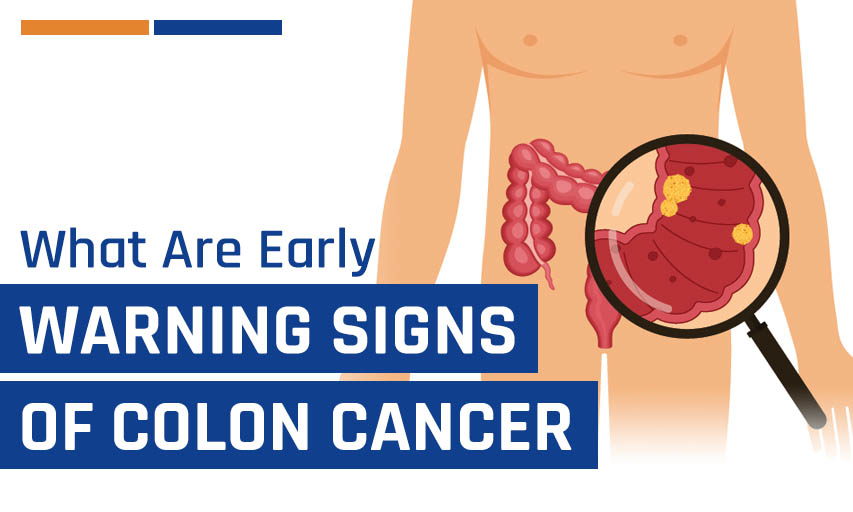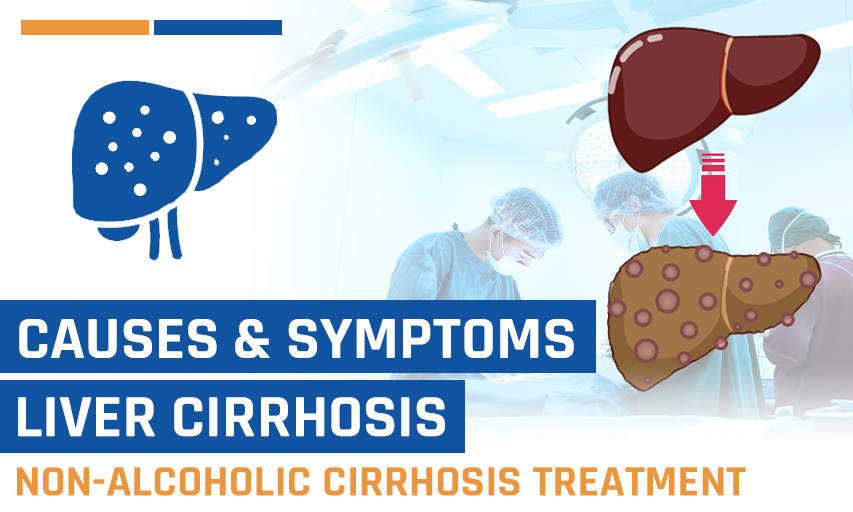What are the 7 Early Warning Signs of Colon Cancer?
Colon and rectal tumors occur when the cells lining the digestive tract become abnormal and grow uncontrollably, potentially affecting surrounding organs and tissues. Early diagnosis and treatment are important for the right treatment, and several diagnostic and screening tests help in identifying the disease. If detected early, colon and rectal cancers are generally treatable. Many patients, including thousands of Africans, travel for treatment for colon cancer in India due to the country's advanced medical facilities, world-class healthcare services, and affordable treatment options. India has become a sought-after country for those seeking high-quality and effective treatments. Adults over the age of fifty should begin frequent screenings, and if you have a genetic predisposition or are at least 45 years old, it’s even more important to start early. The sooner you detect potential symptoms, the better the prognosis. But how do you detect colon cancer, & what are the symptoms to look out for? Learn in this blog.
How Does Colon Cancer Develop?
Colon cancer, also known as colorectal cancer, starts in the large intestine or colon. A common precursor to colon cancer is the formation of polyps, which are growths of cells on the inner lining of the colon. While polyps are quite common and often harmless, some can continue to grow and become problematic. In certain cases, these polyps can also mutate and eventually develop into cancerous tumors. The process of a polyp turning into cancer can take years, sometimes up to ten. This is why regular screening for colon cancer is crucial, even for those showing no symptoms. Early detection through screenings can significantly improve outcomes, allowing for the identification and removal of polyps before they develop into cancer.
What are the Causes of Colon cancer?
Colon cancer is generally not caused by a single factor but rather by a combination of genetic, environmental, and lifestyle factors. It often begins when DNA abnormalities occur in healthy cells of the colon. DNA is the blueprint inside each cell, instructing it on how to grow, divide, and function. Under normal circumstances, your body operates smoothly as cells divide in an organised manner. However, when a cell's DNA is damaged, it can lead to the uncontrolled growth of cells, even when there is no need for new ones. This accumulation of cells can form tumors.
If left untreated, the cancerous cells can spread to nearby healthy tissues and either metastasise, or travel, to other areas of the body, forming secondary cancerous deposits. This is why early detection and treatment are really important in preventing the spread of the disease.
What are the Alarming Symptoms of Colon Cancer?
It is common for colon cancer to go undetected in its earlier stages, but its later stages might produce more obvious signs and colon cancer symptoms. If early-stage patients do have symptoms, these may include the following:
- Stool containing blood
- The sensation that one's bowels have not been completely emptied following a bowel movement.
- Diarrhoea, constipation, or thin, ribbon-like faeces are irregular bowel motions.
- A decrease in hunger.
- Weight loss has no apparent cause.
- Exhaustion and weakening
- Anxiety or discomfort in the abdomen.
- Blood loss from the intestines.
- Diarrhea and vomiting
Colorectal cancer has a one in twenty chance of developing in your life. It's critical to be aware of the warning signs and take steps to avoid contracting this easily avoidable kind of cancer.
What are the 4 Stages of Colon Cancer?
Staging is a process that is used by the doctors to assess the extent of cancer's spread and determine the most appropriate treatment plan. Understanding the stage of colon cancer can also help you estimate the result and prognosis. Here are the 4 stages of colon cancer:
■ Stage 0 (Carcinoma in situ): Stage 0 is the earliest stage of colon cancer, where abnormal cells are found only in the inner lining of the colon or rectum. At this stage, these mutated cells have not spread beyond the mucosa.
■ Stage 1: At this stage, the cancer has grown through the mucosa and spread into the muscular layer of the colon, but it has not yet affected nearby lymph nodes or other organs.
■ Stage 2: In this stage, the cancer has spread to nearby tissues around the colon but has not reached the lymph nodes. It has not yet penetrated the outer layer of the colon.
■ Stage 3: Cancer has spread to the lymph nodes in this stage but has not yet spread to distant organs. At this point, the cancer has invaded deeper layers of the colon and is more widespread.
■ Stage 4: This is the most advanced stage, where the cancer has spread to distant organs such as the liver, lungs, or other parts of the body. Stage 4 colon cancer is metastatic, and its treatment focuses on managing the disease and improving the quality of life.
The patient's medical history impacts the likelihood that the patient may acquire colon cancer.
When Should you be Checked for Colon Cancer?
Although many people know that blood in the stool is a sign of colon cancer, you should also get checked for other bowel changes. Even if you're not experiencing any obvious symptoms, early screening can help increase your chances of detecting the disease in its early stages, when it's most treatable. It’s also worth noting that not all symptoms point to cancer—many other, less serious conditions can cause similar changes. If you’re concerned about your health or have any risk factors for colon cancer, getting checked can help you maintain your well-being and peace of mind.
What is the Growth Rate of Colon Cancer?
Adenomatous polyps, which are clusters of benign cells, are the most common source of colon cancer. If left untreated, a small percentage of these polyps may develop into cancer. More aggressive forms of colon cancer tend to spread more rapidly.
How do You Detect Colon Cancer?
A colonoscopy is a procedure used to examine the inside of the colon and is performed when a doctor suspects that a patient has colon cancer. The decision to perform a colonoscopy depends on the patient's symptoms and the results of several tests. Biopsies are taken during the procedure and sent to a lab for evaluation.
What is the Most Effective Treatment for Colon Cancer?
The decision to choose the best treatment option for a patient's colon cancer depends on a number of factors. The treatment options for colon cancer include.
■ Surgical Resection:
Surgery is a common option for colorectal cancer treatment, especially when chemotherapy fails to eliminate cancerous tumours in the colon or pelvis. Nowadays we also have robotic surgery for colon cancer treatment, with minimal downtime and fewer scars. Surgical intervention is often the only option when a tumour is malignant in these areas. However, if a tumour is not malignant, surgical removal may be an option if other treatments have provided no effective results.
■ Chemotherapy:
Chemotherapy is frequently the first line of defence in treating colorectal cancer. It is done using medications, either alone or in combination, to target and destroy cancer cells in the colon and surrounding areas. While chemotherapy effectively destroys cancer cells, it may also cause side effects such as upset stomach, decreased bone marrow function, and worsening of pre-existing conditions. The method of chemotherapy used and the specific drugs depend on each patient’s specific case.
■ Radiation Therapy:
Along with surgery and chemotherapy, radiation therapy is also used to treat colorectal cancer. This treatment uses high-energy X-rays to damage cancer cells in the colon, duodenum, or pelvis. Radiation can help in shrinking large tumours, but it often comes with side effects such as nausea, fatigue, and other unwanted symptoms.
■ Immunotherapy:
Immunotherapy is a type of cancer treatment option that helps the body's immune system fight cancer. The immune system is responsible for defending the body against illness and infection. Immunotherapy increases the immune response to target and destroy cancer cells more precisely.
What is the Best Way to Prevent Colon Cancer?
It has been shown that colorectal cancer screening—which is assessing asymptomatic patients for the disease—can reduce both the risk of developing colorectal cancer and the mortality rates associated with it. For patients at average risk or those with risk factors, screening should generally begin at age 45 or 50. However, screening guidelines can change as more information about the disease becomes available. It is important to talk to your doctor about your risk factors to determine when you should begin screening. Common screening methods include stool tests and procedures like colonoscopies.
The Bottom Line
Preventative measures can reduce the risk of developing colon cancer. Polyps are often the first stage of the disease, and early intervention can stop colon cancer from progressing. A colonoscopy can help detect and remove these polyps before they become cancerous.
A colonoscopy is the best method for detecting polyps. During the procedure, a gastroenterologist can both identify and remove any polyps found. Most patients at risk of it should begin having colonoscopies at age 50. Early detection is especially important for those with strong genetic risk factors or health conditions that increase the likelihood of them getting colorectal cancer.




















Be First To Comment
Leave a Comment